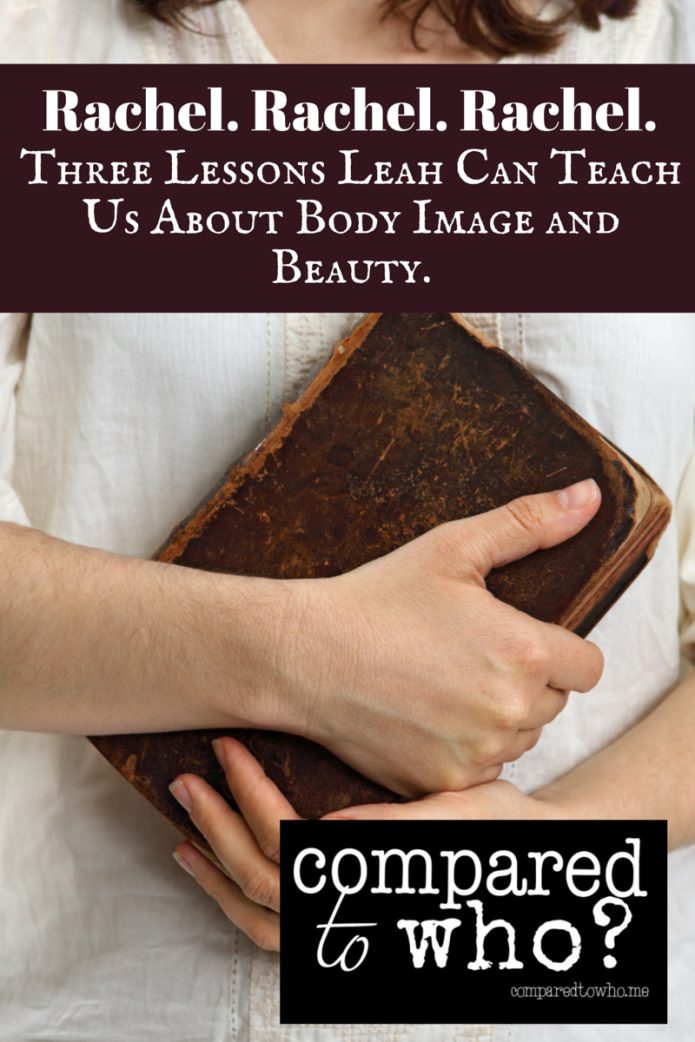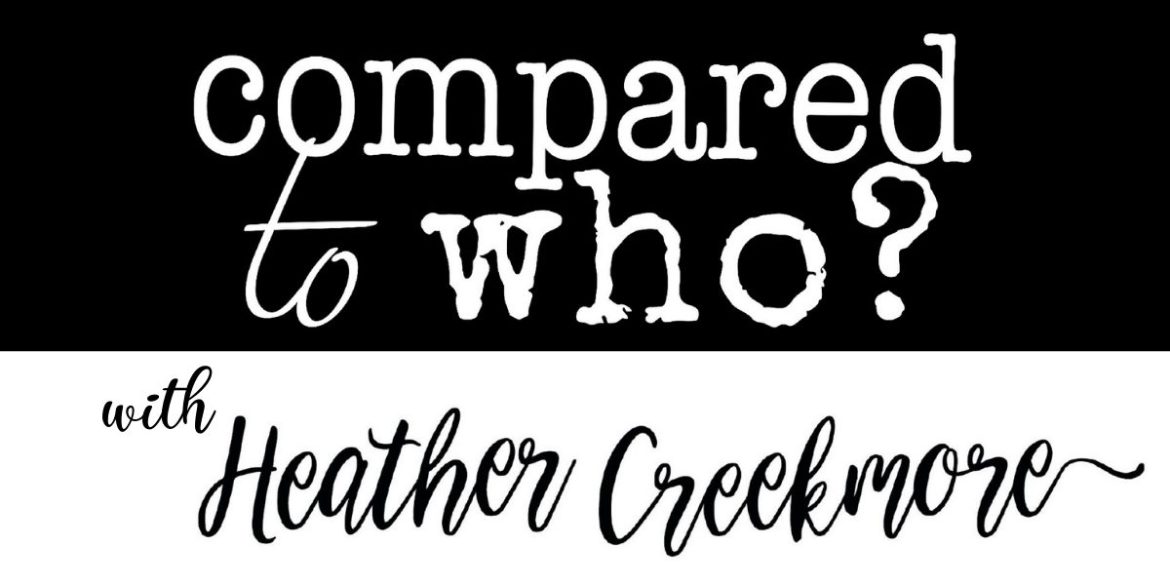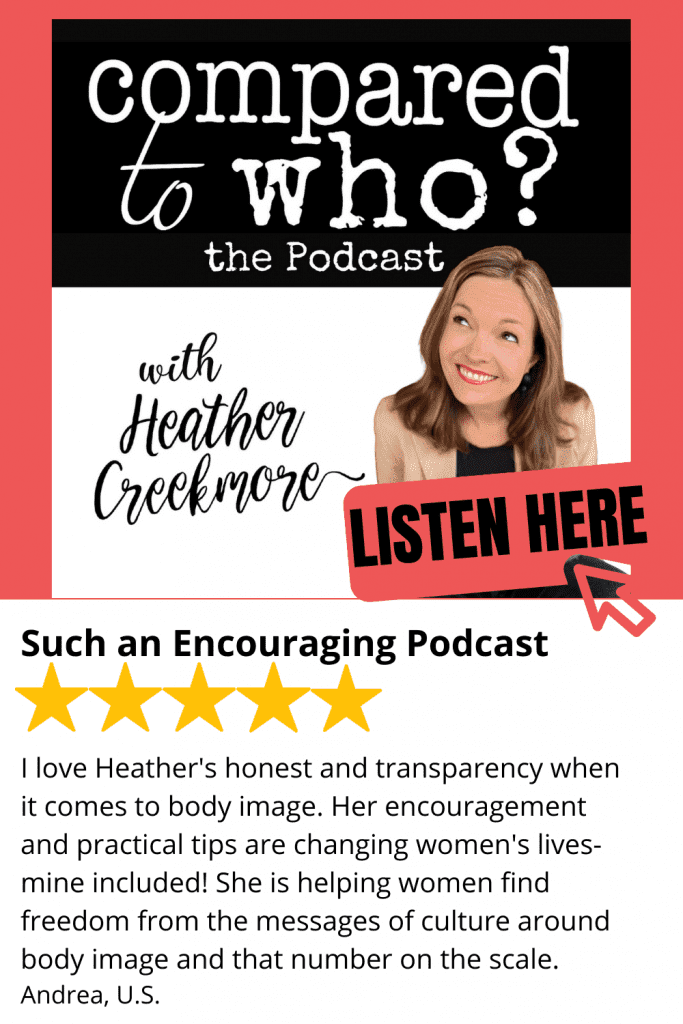I used to believe that Genesis 29:17 was the meanest verse in the whole Bible.
Leah’s eyes were weak, but Rachel was beautiful in form and appearance. (ESV)
How could God tell us that Rachel beamed with physical beauty while Leah lacked great eyes? Isn’t that a bit harsh?
Where’s the follow up verse that clarifies it’s what’s on the inside that counts? Where’s the asterisk that leads to the footnote explanation of how beauty is in the eye of the beholder accompanied by a list of her nicer physical features?
No disclaimers. No excuses. The Bible just goes right out and says it: Rachel was hot. Leah was not.
Yet, there’s a lot we can learn from Leah in the Bible.
I’ve spent many years thinking about poor, physically flawed Leah.
How she must have felt when her father tricked Jacob. How utterly and completely devastating it must have been to hear her own father confirm her greatest fear, “No man will ever love you–you aren’t pretty enough. Pretending you are Rachel is the only way I’m going to get you married.”
Then I picture her wedding day and how she must have felt that night. The confusion involved with desperately wanting to savor the shower of physical love–the pleasure of being physically enjoyed–while knowing, simultaneously, that none of the delight was really intended for her. How can any woman bear the weight of feeling loved only because darkness was hiding all that was true?
Behold, it was Leah.
First light’s revelation only compounded Leah’s suffering: her brief taste of warm acceptance doused with an ice bucket of cruelty. For a woman, the severest form of rejection is that which follows physical intimacy.
And out of a heartbroken place, I picture her shouting, “Rachel, Rachel, Rachel.” I see it as a more soulful rendition of the 1970’s sitcom character Jan Brady’s lament of the pain of living in a beautiful sister’s shadow.
Though scripture doesn’t explicitly tell us this, I also imagine Leah screaming at the sky, “This isn’t fair. Why didn’t you make me more beautiful?”
But I believe God’s answer would have been: Physical beauty won’t save you, Leah.
Truth was: Physical beauty couldn’t save Rachel either.
The story of two sisters, Rachel and Leah–married to the same man and trapped in the continuation of a sibling rivalry that had likely started well before their wedding days–shows us some amazing truths about physical beauty. Though it played out thousands of years ago, we can readily apply their experience to our body image battles today. Here are three lessons we can learn:
1. God Didn’t Make Every Woman Equally Beautiful, Physically.
It’s a really nice sentiment that we like to throw around to help everyone feel better and “overcome” their body issues. But, it’s just not true. Not according to scripture, at least. Although some scholars believe Leah was likely pretty with some sort of eye problem being her only distinguishing flaw, others believe that the Bible intentionally makes a distinction between the two women so we can fully grasp the tension in their relationship. Either way, the Word is clear that Rachel was, physically, more attractive than Leah. But, God doesn’t apologize for this or add an extra verse about Leah having a great personality. Why? Keep reading . . .

2. God Doesn’t Allow Physical Beauty, or Lack Thereof, to Impact His Plans.
Leah married Jacob only because her father pulled a bait and switch on her sister’s would-be groom. And yet, what happens? Leah bears Jacob many sons, one of whom is in the lineage of Jesus Christ. God uses the “uglier” sister, a twisted wedding night deception, and a whole lot of crazy competition between the “sister wives” to establish a home for the eventual twelve tribes of Israel, one of whom was Judah (the forefather of the Messiah).
When Leah names Judah, she says, “This time I will praise the Lord” (what Judah literally means). She reveals to us that her heart is in a different place after this baby’s arrival. The names of her other sons reflect a desire to have her husband see, hear, and pay attention to her, but, when Judah comes along it seems Leah has finally realized that fulfilling God’s purpose is more satisfying than the attention of any man.
God is sovereign (Romans 9). He uses whom he wants, when he wants, according to his purposes. The blind man was born blind to accomplish God’s purpose (John 9:2-3). Leah was born with “weak” eyes also to accomplish God’s purpose.
Isn’t it possible that some are given great physical beauty as a part of God’s plan for their lives and others are not and that doesn’t really matter? Why is it not okay that physical beauty be just another attribute that doesn’t carry the weight of ultimate importance in our lives…just like some are blessed financially or others are given great musical talent or administrative gifts? Maybe God doesn’t apologize to us for not making Leah as beautiful as Rachel because it doesn’t really matter what she looks like, he still knows how he will use her to accomplish his purpose and that, alone, will bring great fulfillment.
3. More Beauty Doesn’t Mean Fewer Problems
Beauty lies to us. It deceives us into believing that it will make our lives easier, better. Rachel shows us this isn’t true.
Rachel’s beauty was verifiable–her status as “gorgeous” is recorded in the inerrant word of God. And, yet, Rachel struggled.
She thought being married to the man who swept her off her feet would make her happy. It didn’t last. She struggled with infertility. Her husband dealt with her harshly. And though she had clearly “won” the beauty contest with her sister, she still eventually found reason to envy her and let jealousy lead her into a bad case of the crazies.
Physical beauty never equates to fewer difficulties. Being physically “perfect” doesn’t guarantee you a pain free marriage (or a wedding ring), an easy family, or a stress-free life. In fact, being physically beautiful gives exactly zero bonus points redeemable for a better life here on earth.
Beauty falls short on all of its promises. If you don’t believe me, just ask any celebrity or model. Ask any woman renowned for her gorgeous looks if she never feels hurt, rejection, or disappointment. Her answers may surprise you.
The truth is: Leah wasn’t cursed by God with dim eyes that ruined the otherwise fabulous trajectory of her Old Testament life.
Rather, God used her, weak eyes and all, to accomplish his purpose. He called her, blessed her, loved her, and redeemed her–paying no mind to her perceived physical flaws.
I believe he does the same for us. And, I think that’s what Leah would want us to know: satisfaction doesn’t come from winning the beauty rat race, earning your husband’s love or bearing a house full of children. Instead, it comes from finding fulfillment in God’s purpose and embracing his love.
What do you think?
Interested in more great truths about your value from Compared to Who? Check out Heather’s book! Or, listen to the Podcast on Rachel and Leah in the Bible here.





Thanks for the article. Came across it today and thought it was good. We have to be honest that the world values beauty and beautiful women triumphed in the world because of beauty. Neither should we be an ostrich and pretend that beauty does not matter at all, because it affects our interactions with every man and woman in the world daily (Also why women pay so much for beauty services) Yet God saw Leah’s suffering (direct result of not looking beautiful in husband eyes, and the Bible never did say Jacob loved her maybe he respected her that’s all). My point is God does not make all things equal in the things that matter to you as a woman and wife in this life time. Still, we trust He sees our needs and stand with us in our sorrows.
Amazing Post! Well said 🙂
Several people have actually said that a more accurate translation of Leah’s ‘weak’ eyes is ‘gentle’ or ‘tender’. See:
http://www.egrc.net/articles/Rock/Puzzling_Passages/GentleEyesLeah.html
Leah was most likely beautiful as well, but in a less showy, more refined way.
Yes, scholars do have different definitions of weak. But weak and “dim” are the two definitions that I think make the most sense given the greater truth of the conjunction “but” in that sentence. Trying to define the word without the context of the whole sentence can change its meaning. If God intended for us to know that they were both beautiful, just in different ways – I believe the conjunction would have been “and” — as in “Leah’s eyes were weak, AND Rachel was beautiful in form and appearance.” Thus, I’m more likely to adopt the view that God wanted to compare and contrast the two women’s beauty — and not tell us that they were both physically beautiful. There are other places in scripture where God shows us that a woman is physically beautiful, but when then other times where he chooses not to describe their physical appearance at all. This is the only place where he compares what two different women look like. 🙂 I guess we’ll find out who’s right when we get to heaven!! 😉 Thanks for your comment!!
Never really heard anyone give such insight on the story of Leah and Rachel, and for someone who has been battling with self-image for a long time, I find this very educating and a blessing. Thank you!
I’m glad it blessed you, Amaka! Hugs and prayers for your journey to seeing yourself as Christ sees you!
Amazing insights.this is so liberating.mine has not been a struggle with physical beauty but with the meaning attached to the name Leah. Looking at my life ,i sought to know the meaning of the name and the similarity of the meaning of the name and circumstances of my life was kind of disturbing,its a life of struggles. Its liberating to look on the other side and know that GOD can use anyone in our different circumstances for HIS Devine purposes
Amazing post!
This is so helpful. I should realize that relationship with God is better than relationships with people.
Thank you
Thank you Albi! Hugs!
Wow! Just wow
Excellent post, Heather! Thoroughly enjoyed the truth you drew out for us is that the bottom line of anything we do for God is to give Him glory.
Thank you, Cindy!
One of the best posts I have ever read. Its encourages and motivates. Bless you.
Thank you so much, Diana!
What an awesome post! I have truly been blessed by your words.
Thanks so much, Nikki!
Thank you for the powerful revelation that is often overlooked. How liberating for women. Can’t wait to share it with others.
Blessings,
Kim
Thanks, Kim!!
Excellent post! I love learning about and from the women of the Bible. I think this post nails it on the head in terms of crystallizing all God wants us to learn from their story. Thank you so much for sharing this!
God bless,
Patty
Thanks, Patty! So glad you enjoyed it! Thanks for chiming in. Really appreciate your sweet note. God bless you!
Great post! It caught my eye on Pinterest. You convey some beautiful points about Go’s ability to use us, and write it all so well. 🙂
Thank you so much Hannah! 🙂
Wonderful insight…I too thought God was unfair in his pronouncement of the beautiful women in the Bible….but he wasn’t endorsing it as a standard to which we all must obtain. It is a fact men gravitate toward beauty…women as well. But, beauty can be only skin deep. I agree…God has his purposes.I argued in my heart why did the “potter” form me “the clay”, as an “inferior pot” down through the years…what a waste of time and “joy” robbing. To finally put aside that obsession and find Jesus as my bridegroom and his love and presence with me far outweighs a fickle man whose love depends on the outward self. We all get wrinkled eventually!!!
Awesome words, Ingrid! Thanks for that. You have awesome insight!
I have changed, am toning up my body alternating essentrics DVD’s by Miranda Esmonde- white, with cardio days for 30 min on treadmill at almost 60 yrs old. I have not worried about losing weight, but have a host of Bible studies on weight loss through renewing your mind.I also started fake tanning which makes one look better. But it will be better to cultivate a meek and gentle spirit and closer relationship with Jesus, which is far more important. Self control is a fruit of the Spirit, so it would be good to be the best I can be.
Hi
Preach Ingrid!
Heather I read your book and it powerfully convicted me and began the process of repenting and being set free from the mental prison I’ve lived in all my life. Thank you so much for sharing your thoughts and transformation so honestly. I’m telling every woman I’m close with about it!
Love this post too, thank you!
Thanks, Steph! I’m so glad to hear that! Excited to hear that you are on the road to freedom! Hugs! Heather